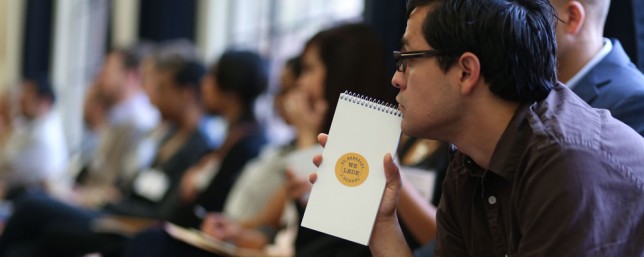About the Program
The first ever summer-only minor at UC Berkeley is designed to give students hands-on training in improving and modernizing their skills across a wide range of communication media, including narrative writing and reporting, web skills, social media, photography and video, and audio reporting and production.
No matter your major or intended profession, literacy today requires the ability to communicate not just with text but also with pictures, video, and sound. Although Millennials are often described as “digital natives” and are accustomed to ubiquitous flows of online information, many do not know how to shape that information into compelling, well-reported narratives. Instruction will focus on teaching students to use the latest digital tools to engage with audiences in their work and to think critically and responsibly about information.
The minor is open to all Berkeley students. For visitors—including students from abroad, from UC campuses elsewhere, or from other universities—a certificate option is available. Courses are also open to students who are not seeking the minor or a certificate.
The undergraduate minor is housed in the UC Berkeley Graduate School of Journalism, which is widely regarded as one of the top professional journalism academies in the United States. Its teaching faculty is composed of distinguished current and former professional journalists who bring real-world expertise to the classroom. The master’s program was launched in 1951 and established as a professional school at UC Berkeley in 1968.
Declaring the Minor
Students intending to pursue the minor degree must submit a Declaration of Intent to Pursue the Undergraduate Minor in Journalism with the Director of Undergraduate Programs at the GSJ upon completion of their first course.
Students must submit a Completion of the Undergraduate Minor in Journalism form at the start of their final course in the minor sequence.
Students with a strong interest in an area of study outside their major often decide to complete a minor program. These programs have set requirements and are noted officially on the transcript in the memoranda section, but are not noted on diplomas.
Summer Minor Requirements
The curriculum is organized into two parts: two core courses followed by three elective courses, emphasizing respectively, fundamentals and focused expertise.
There are two required introductory courses—the first on journalistic reporting, writing, principles and ethics; and a second course on new forms of digital media and techniques of online storytelling. After completing the two required courses, students choose three elective courses in which they receive hands-on training in specialized reporting and/or multimedia production. All courses are upper division. The two parts of the curriculum—a broad introduction followed by focused study—are designed after the successful model currently taught in the Graduate School of Journalism.
General Guidelines
- The minor degree consists of a minimum of 15 units (five 3-unit courses).
- All courses taken to fulfill the minor requirements must be taken for graded credit.
- A minimum grade point average (GPA) of 2.0 is required for courses used to fulfill the minor requirements.
- All minor requirements must be completed prior to the last day of finals during the semester in which you plan to graduate.
- The minor is open to enrollment for all Berkeley students.
- No more than one upper division course may be used to simultaneously fulfill requirements for a student's major and minor programs.
| Code | Title | Units |
|---|---|---|
| Required Courses | ||
| JOURN 100 | Introduction to News Reporting | 3-4 |
| JOURN 110 | Introduction to Multimedia | 3 |
| Electives (Choose Three) | ||
| JOURN 111 | Social Media and Journalism | 3 |
| JOURN 115 | Advanced Multimedia | 3 |
| JOURN 120 | Investigative Reporting | 3 |
| JOURN 130 | Specialty Reporting | 3 |
Faculty and Instructors
+ Indicates this faculty member is the recipient of the Distinguished Teaching Award.
Faculty
Orlando Bagwell, Professor in Residence.
Lowell Bergman, Professor. National security, forensic science, terrorism, corporate crime, corruption, tobacco, Symposium in Investigative Reporting.
Research Profile
Lydia Chavez, Professor. Jounalism, reporting, writing.
Research Profile
Mark D. Danner, Professor. Central America, politics, Balkans, foreign affairs, journalism, Haiti, documentaries.
Research Profile
William J. Drummond, Professor. Politics, journalism, reporting, national security, freelancing in both print and radio.
Research Profile
Tom Goldstein, Professor. Journalism, mass communications, writer, reporter, editor.
Research Profile
Richard Hernandez, Assistant Professor. Journalism, new media, Mobile, visual storytelling.
Research Profile
Ken Light, Adjunct Professor. Journalism, photojournalism, documentary photography.
Research Profile
Michael Pollan, Professor. Agriculture, environment, obesity, science, nutrition, journalism, food, cooking, gardening.
Research Profile
Edward Wasserman, Professor. Media ethics, economics and politics of news, professional standards, media history.
Research Profile
Lecturers
Thomas R. Burke, Lecturer.
Andres Cediel, Lecturer.
Marilyn M. Chase, Lecturer.
Edwin C. Dobb, Lecturer.
Deirdre English, Lecturer.
Laura Green, Lecturer.
Shaleece Haas, Lecturer.
Adam Hochschild, Lecturer.
Jennifer Kahn, Lecturer.
Daniel K. Krauss, Lecturer.
Ben Manilla, Lecturer.
Timothy Mcgirk, Lecturer.
Alan Mutter, Lecturer.
Thomas Peele, Lecturer.
Kara A. Platoni, Lecturer.
Jeremy Rue, Lecturer.
Linda Schacht, Lecturer.
Zachary J. Stauffer, Lecturer.
Abbie Vansickle, Lecturer.
James R. Wheaton, Lecturer.
Samantha G. Wiesler, Lecturer.
Emeritus Faculty
Joan Bieder, Senior Lecturer SOE Emeritus. History of Jewish communities in South East Asia.
Research Profile
Robert Calo, Professor Emeritus. Journalism, cultural geography, social history, urban affairs, television news production.
Research Profile
Jon Else, Professor Emeritus. Directing, history, film, journalism, writing, documentary, producing, cinematography, nuclear weapons.
Research Profile
Timothy Ferris, Professor Emeritus.
Cynthia Gorney, Professor Emeritus. Ethics, law, journalism, writing, reporting the news, profiles.
Research Profile
Neil Henry, Professor Emeritus. Race, Africa, urban society, journalism, newspapers, community reporting, journalistic values, foreign reporting, sports, fraud.
Research Profile
Thomas C. Leonard, Professor Emeritus. Journalism, the press, role of the press in society, journalists and historians, Americans, American history.
Research Profile
A. Kent Macdougall, Professor Emeritus.
Carolyn Wakeman, Professor Emeritus.
Contact Information
Graduate School of Journalism
121 North Gate Hall
Phone: 510-642-3383
Fax: 510-643-9136
Acting Director of Undergraduate Programs
David Thigpen
B-42 North Gate Hall
Phone: 917-848-9365
Student Adviser
TBD
